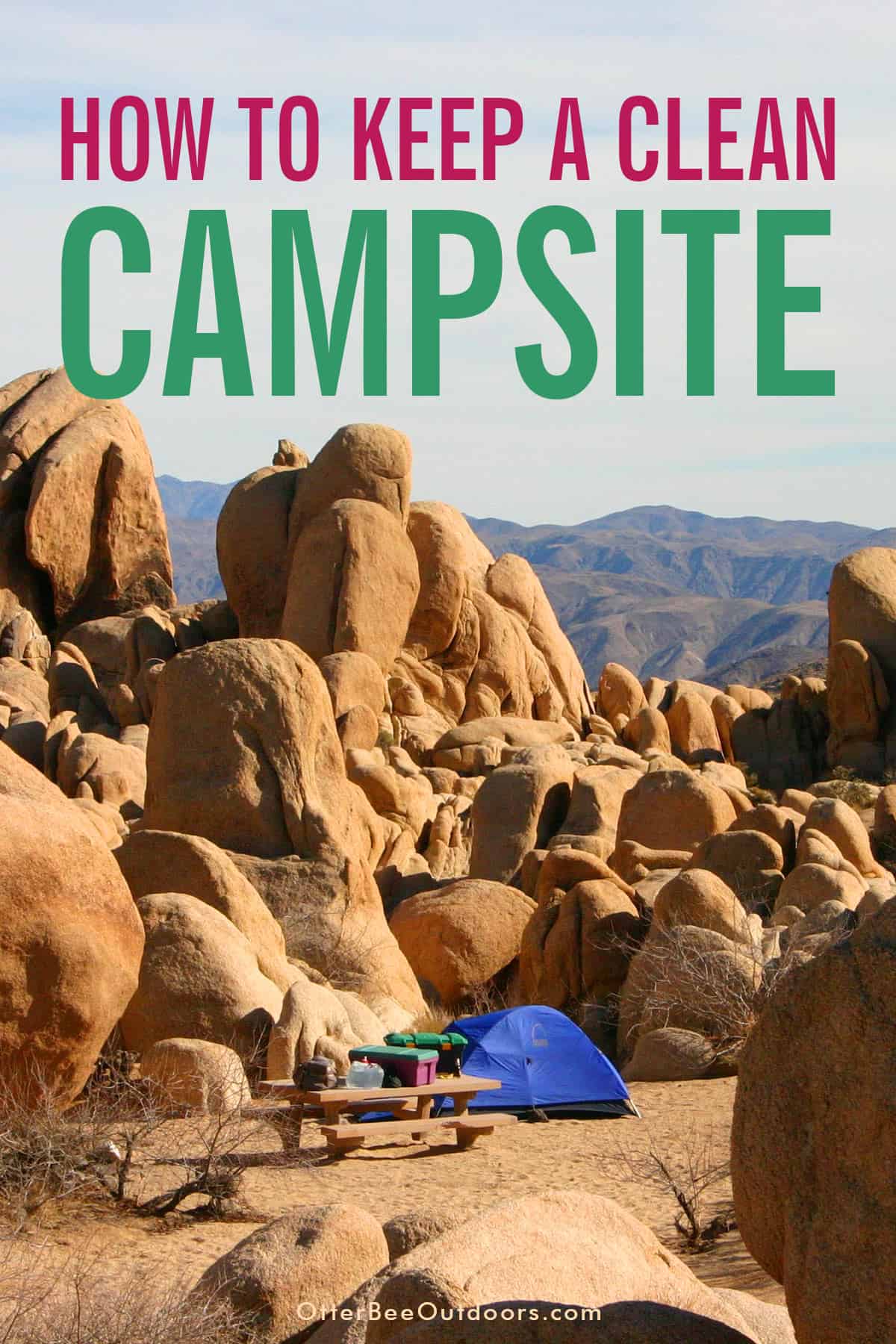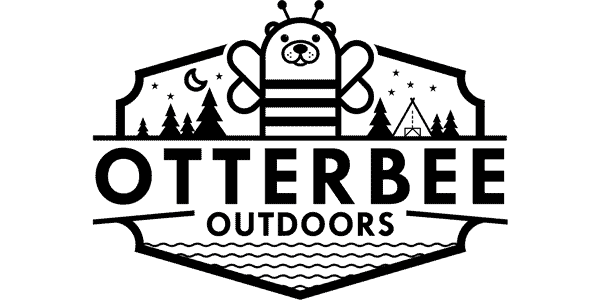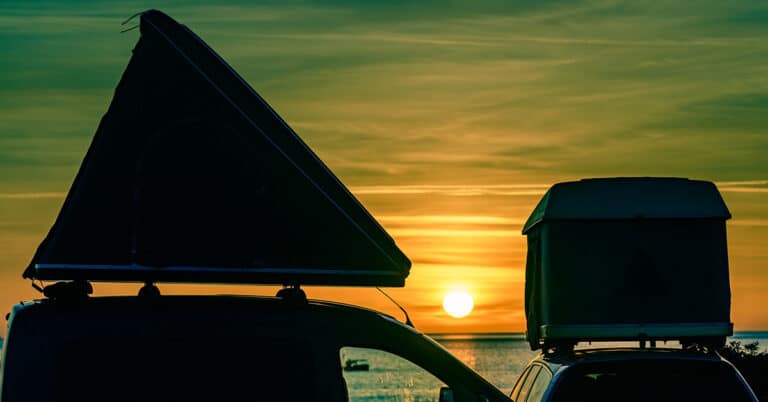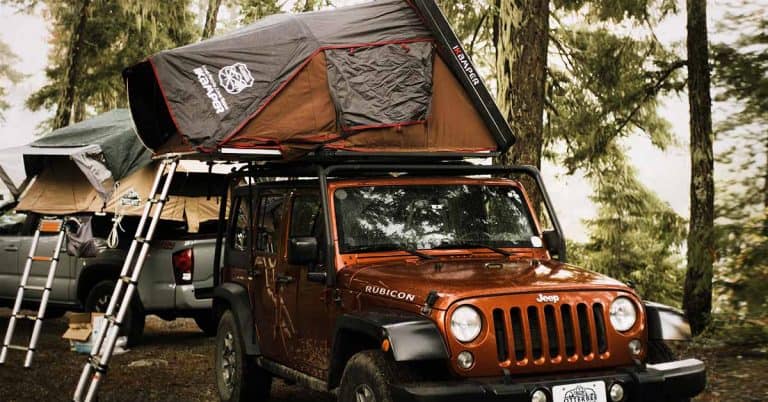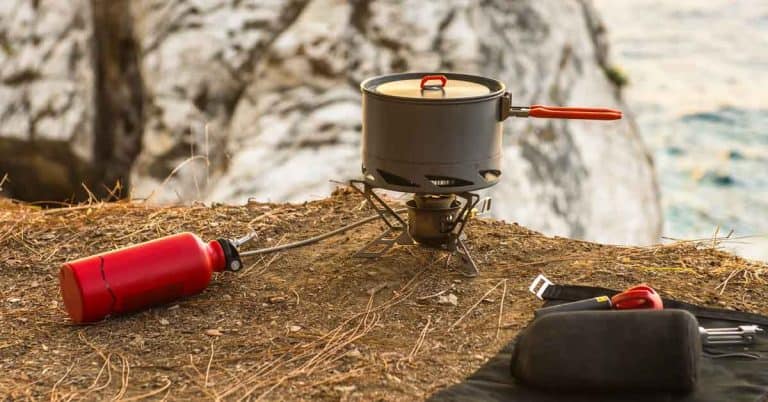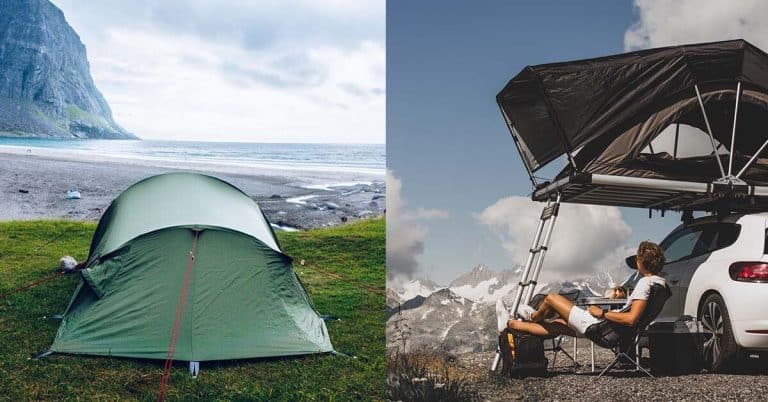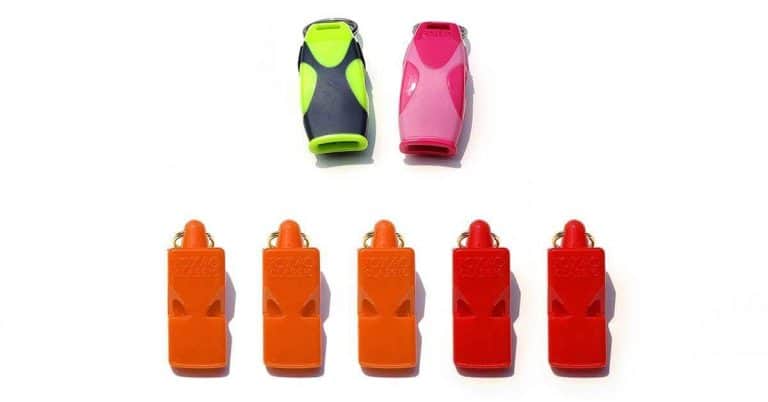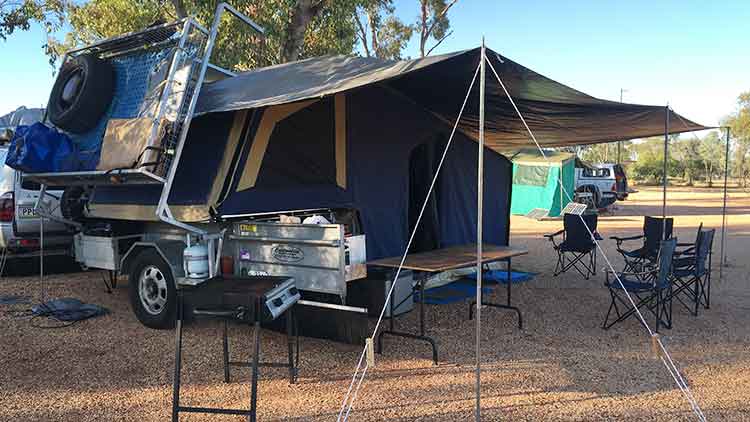Disclosure: I am compensated for purchases made through some links on this site. Click for details.
Keeping a clean campsite requires a little forethought, preparation, and work.
Before your camping trip, you’ll need to get some cleaning supplies, reusable kitchen supplies like cookware, dinnerware, containers, a tarp, bear-resistant containers, and more.
Will other campers be with you too? Talk to those you’re camping with about the importance of leaving the campsite the way you found it… or better.
Preparations for a Clean Campsite
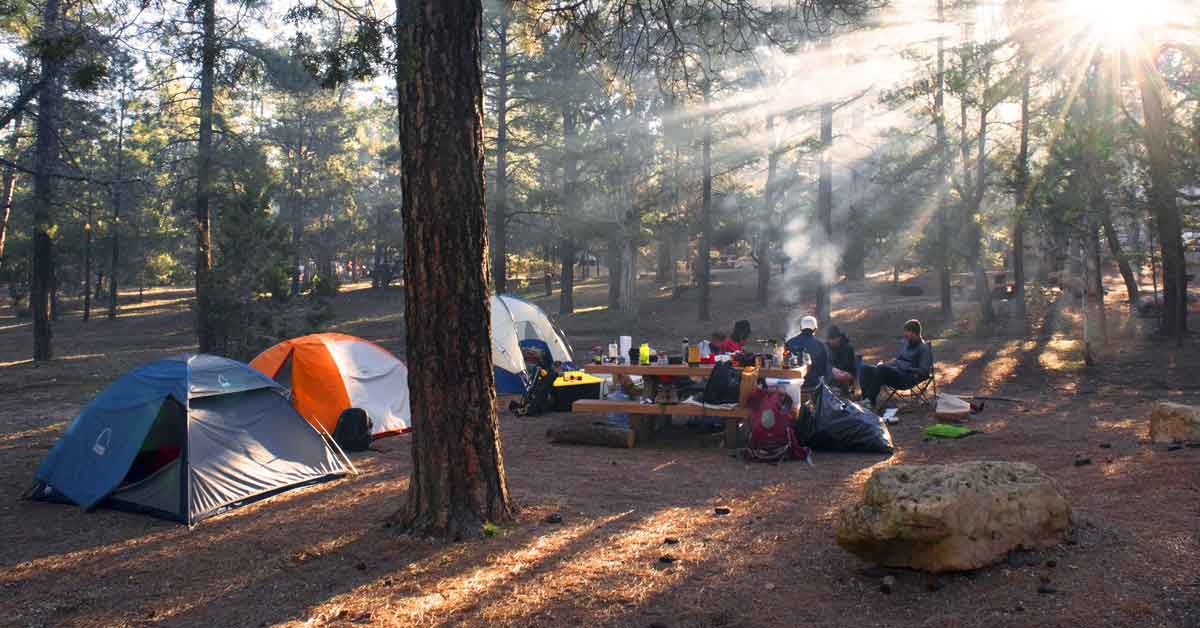
In the excitement before your camping trip, don’t forget about these important preparations before heading out on your adventure:
Clean Your Camping Gear
In the week before your trip, spend some time cleaning your tent, sleeping bag, and backpack. Make sure there aren’t any crumbs or food stains. Lingering food odors can attract pests and bears. Specially formulated cleaners for your outdoor gear like Nikwax Tech Wash work best.
Why store dirty gear away? I know you might be tired after your camping trip, but if you clean your gear before putting it away, you get to skip this step. It also extends the life of your gear.
Cleaning your gear and letting it thoroughly dry helps prevent mold and mildew and any lingering food or other debris won’t cause damage to your gear while it’s stored.
Cleaning after each trip also gives you time to make needed repairs or replace worn-out or damaged gear. Waterproofing, patching, zipper repair, and tent pole repairs are common maintenance concerns.
Want some cleaning tips for your tent, sleeping bag, or backpack? Here are a few short yet helpful videos from REI.
How to Clean Your Tent:
How to Clean Your Sleeping Bag:
How to Clean Your Backpack:
Does Your Campsite Have a Bathroom?
Before you hit the road, check to see if your campsite has a bathroom or outhouse. If not, you’ll need to bring a trowel like the Sea To Summit Alloy Pocket Trowel for digging cat holes for your feces and wastewater from cleaning camp dishes.
If burying human waste is not permitted, the Cleanwaste Go Anywhere Toilet Kit makes a great option for packing out your waste. The Cleanwaste Dry Toilet System is a toilet in a bag containing a powder that gels waste, neutralizes odors, and begins the decay process. The kit also includes toilet paper and hand sanitizer.
If you’re car camping and want to go all-in, consider the Cleanwaste Portable Toilet and Privacy Tent. The ladies in your life will enjoy it more than squatting behind a tree… Check out the Complete Cleanwaste Anywhere Portable Toilet System at Amazon.
If you’re bringing your dog, don’t forget poop bags for your pup too.
Pack Campsite Cleaning Tools and Supplies
There are some cleaning tools and supplies you’ll want on your camping trip.
- You’ll want a broom and dustpan to use on the inside of your tent and around your picnic area.
- Scouring pads are often needed for cleaning your pots and pans. You don’t want to leave dirty pot and pans. They’ll attract critters.
- Biodegradable soap like Sea To Summit Wilderness Wash soap for washing dishes, hands, and showering.
- Trash bags
- Reusable, launderable shop towels are more environmentally friendly than paper towels when camping. Just wash them thoroughly and dry at the campsite.
Reusable Campsite Kitchens
Reusable kitchens reduce waste, minimize food residue, and are less likely to attract animals and insects.
Consider using the following items when assembling your camp kitchen:
- Collapsible cookware
- Reusable camp dinnerware
- Reusable utensils
- Collapsible food containers are great for reducing waste while camping. Remove food packaging before you get to camp and store your food in reusable food containers that you can wash out.
- Collapsible camp sinks make it easier for you to clean up after yourself and are great for minimal-impact camping. You’ll want one for suds and one for rinsing. When washing up, use a biodegradable soap for the outdoors and locate 200+ feet away from any natural water source to minimize your environmental impact.
Reduce Food Packaging Before Camping
As you prepare or gather food for your camping trip, plan meals to avoid leftovers and be sure to remove any unnecessary packaging. The less food packaging with residue, the less likely you’ll attract bugs, bears, raccoons, and other hungry critters.
This is where collapsible food containers come in handy. You can wash them to get rid of the food residue.
Minimizing food packaging also reduces the possibility of litter or need to pack out trash from campsites without proper trash bins.
Pack Small Camping Items in Storage Bins
Keep your clutter together by storing smaller items in Rubbermaid Action Packer storage containers. These durable containers make it much easier to haul small items to your campsite and to keep up with odds and ends ins.
Containers help prevent loss. Items are less likely to get spread around the campsite, misplaced in the car, and can easily be locked away to prevent theft at your campsite.
Bear-Resistant Containers for Food Storage
Don’t forget about the bears while camping, raccoons too. To keep these animals out of your food, you’ll need one or more bear-resistant containers. Rubbermaid containers won’t do.
Also, you shouldn’t count on bear-resistant trash cans being present where you camp. Be sure to reduce food packaging when you pack for your camping trip and bring an extra bear-resistant container for trash with food residue.
Clean Campsite Setup Tips
When you arrive at your campsite, there are some setup tips for keeping your campsite clean. It’s best to do these in order.
- When arriving at your campsite set up your trash and recycling bags before doing anything else. The trash from the trip and what’s created during the campsite setup will need to be thrown away. This is where pop-up camp trash cans and pop-up camp recycle bins come in handy if you’re car camping. They keep things tidy and minimize your trips to the camp’s waste bins.
- Comb over your campsite for trash before setting up camp. You especially want to throw away any food or food packaging left by previous campers.
- Spread out a tarp where you’ll be cooking and eating to catch crumbs and reduce your clean-up time. Hook tent stakes through the grommets of the tarp will keep it in place.
- Help keep your tent free of mud by positioning your tent away from water sources like spigots or dishwashing stations. These can cause water to pool near your tent.
- Placing a coarse rubber doormat outside your tent can significantly reduce debris in your tent. Leave your hiking boots on the mat in a breathable sack to keep out bugs while also letting moisture escape or place them on a boot tray inside your tent. A boot tray will corral any dirt and moisture left on your boots.
Clean Up After Campsite Meals
Wash the dishes immediately after every meal and make sure to clean up your campsite before the sun goes down. Once you’re through cleaning, make sure to pack everything safely away.
Cleaning up after dark is challenging. There’s often a lack of light to do a proper job and motivation is often low. The day’s adventure can often tire us out.
There are a few things you should remember as you’re doing the dishes:
- Use biodegradable dish soap to wash your dishes… hands, and body too. This soap should be used 200 feet away from natural water sources.
- Strain food particles from the dishwater when you’re done. Mesh strainers work well for this.
- Always dispose of your strained wastewater in a campsite sink, toilet, or far away from your campsite in a cat hole 6 to 8 inches deep. It’s a good idea to pour it in various cat holes instead of one. This will reduce your chances of attracting unwanted animals.
- You don’t want to attract bears, raccoons, or other animals. Food strained from dishwater, meat fat, and other leftovers should be disposed of in bear-safe trash cans at the campsite or put in bear-resistant containers along with dirty napkins, dirty paper towels, and food packaging.
Clean Up After Your Campfire
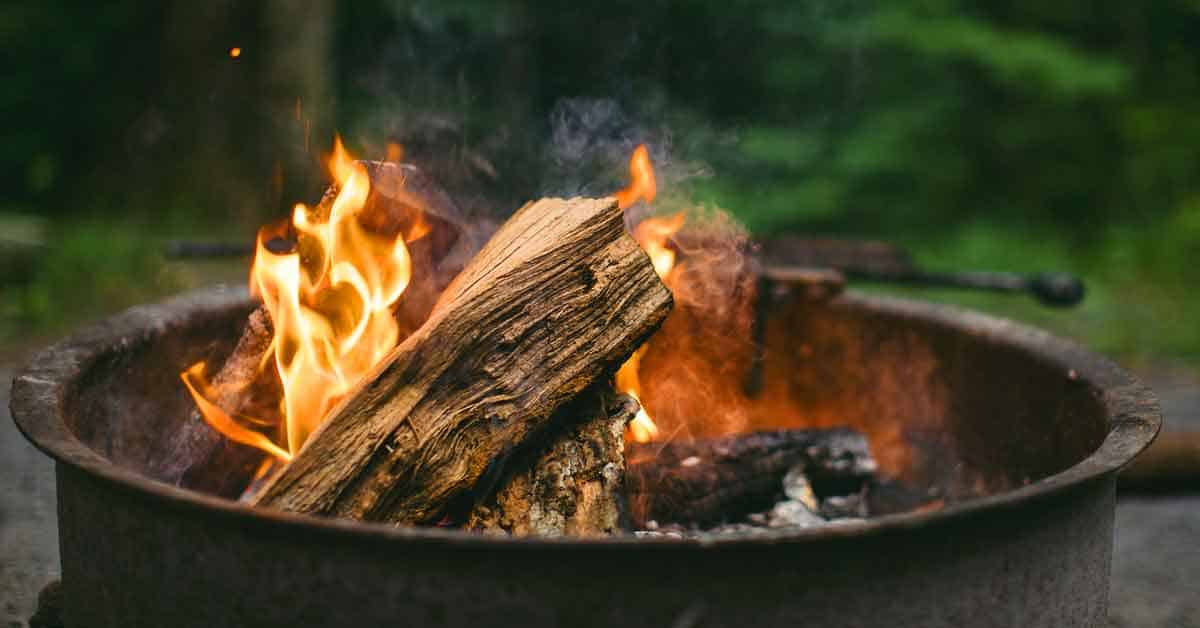
You have to clean up after your campfire too. Here are some ways to make campfire cleanup easier:
- Build the smallest campfire needed.
- Use an existing campfire ring.
- For safety, make sure the wood placed on the fire has time to burn out before going to bed.
- Do not burn trash or leftovers.
- Spread the cold ash and thoroughly soak it with water to prevent forest fires.
- Practice Leave No Trace techniques and leave things where you found them. When breaking camp, if you used area rocks to make a fire ring, be sure to put these rocks back where you found them after they’ve cooled.
- If you pulled a log up to sit on at your campfire, put it back. Bringing your own camp chairs will help protect nature.
Leave The Campsite Better Than You Found It
Do not modify a campsite to meet your needs and leave the campsite like you found it or better. Unfortunately, people often leave trash that you can throw out or pack out with your garbage.
Thoroughly clean your campsite before leaving. If you’ve followed these tips, cleaning up your campsite will be a breeze. Gather all trash, don’t leave an open cat hole, and keep an inventory of your items to reference when packing up. You don’t want to leave any of your camping gear.
